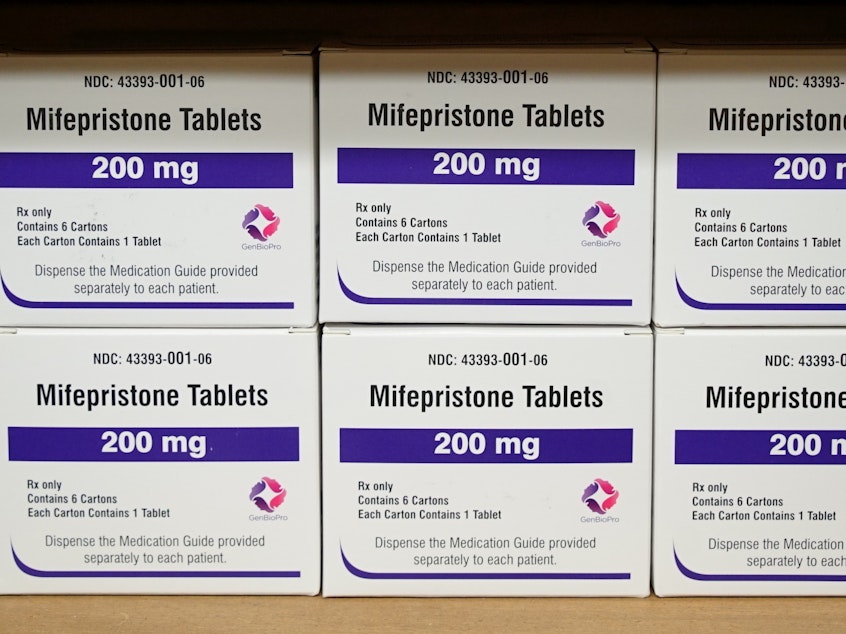U.S. judge says FDA wrongly approved key abortion pill, putting access in jeopardy

Updated April 7, 2023 at 7:58 PM ET
A federal judge in Texas ruled Friday evening that the U.S. Food and Drug Administration improperly approved an abortion drug used in nearly all of the medication abortions in the U.S., putting access to the drug mifepristone in jeopardy.
U.S. District Judge Matthew Kacsmaryk gave the government a week to seek relief from an appeals court.
The judge's decision won't just affect people living in states where abortion has become illegal or heavily restricted: because the case is in federal court, the judge has the ability to issue a nationwide ruling.
At the same time Friday, a federal judge's ruling in a separate case filed in Washington state has blocked the FDA from removing mifepristone from the market.
Sponsored
It is not clear how each judge's decision will impact the other, and both cases are likely to be appealed.
Mifepristone, was approved by the FDA in 2000 for use in combination with a second drug, misoprostol. More than half of all abortions in the United States are done using medication, as opposed to a surgical procedure, and the two-drug combination was used for 98% of them in 2020, according to the Guttmacher Institute.
A coalition of abortion rights opponents filed the lawsuit last year, saying the protocol was improperly approved by the Food and Drug Administration. The group had asked Kacsmaryk, who was appointed by President Trump and has longstanding ties to conservative religious groups, to overturn the approval.
The decision comes three weeks after Kacsmaryk held a hearing in Amarillo in a courtroom that had room for only a few dozen members of the public and the press. No recording or public livestreaming was permitted.
An appeal is expected to go to the U.S. Court of Appeals for the Fifth Circuit, which has a reputation for being a conservative jurisdiction. The case ultimately could end up before the U.S. Supreme Court.
Sponsored
Nationwide implications
Abortion providers nationwide say they've been preparing to rely on another medication abortion regimen using misoprostol alone. Misoprostol is prescribed primarily for ulcers, and is already widely used off-label for other gynecological purposes in the United States.
Research suggests the single-drug regimen is somewhat less effective and often causes additional side effects. But the World Health Organization says the method, which has been used internationally for decades, can be safe and effective at the appropriate dosage.
The decision likely will mean uncertainty and confusion for doctors and patients, says Farah Diaz-Tello, senior counsel with the reproductive rights legal advocacy group If/When/How.
"People who are seeking an abortion with pills ... are going to find it much more difficult to do so, especially in the time period as providers figure out what they're going to be able to do," she says. "So I think we're going to see an immediate exacerbation of the crisis of access that already started in June of 2022" with the U.S. Supreme Court decision last year in Dobbs v. Jackson Women's Health Organization, which overturned decades of abortion-rights precedent.
Sponsored
Diaz-Tello predicts more people will look to induce their own abortions without medical supervision, using medications obtained online or in other countries. She also worries about the risk of increased scrutiny of patients seeking medical care for emergency complications from either self-managed abortions or miscarriages.
She says there are no state laws to her knowledge that require healthcare providers to turn in patients suspected of inducing an abortion, but she worries the ruling will fuel confusion and misinformation.
"I am worried that ... that is going to translate into a misunderstanding that is going to lead to the criminalization of people who end their pregnancies," Diaz-Tello says.
Dueling decisions
The implications of the Texas ruling is complicated by the outcome of the case in Washington state by a coalition of 12 Democratic attorneys general. The group sought to block the FDA from pulling the drug from the market and asked the court to remove the agency's additional layer of restrictions on mifepristone.
Sponsored
The judge in that case ruled Friday that "altering the status quo and rights as it relates to the availability of Mifepristone."
Washington State Attorney General Bob Ferguson has told NPR that he believes his lawsuit could make it possible for patients in those dozen states to continue using mifepristone for abortion — even if the federal judge in Texas issues a ruling intended to block access.
Amanda Allen, senior counsel and director for the The Lawyering Project, which supports abortion rights, says the two courts "could come out with two very conflicting orders, and they could impose very different obligations on the FDA that would be very untenable for the FDA to try to reconcile."
Allen says the FDA could decide to issue guidance for prescribers about how to interpret the rulings. But she says such a conflict between the federal courts might well end up before the U.S. Supreme Court. [Copyright 2023 NPR]



